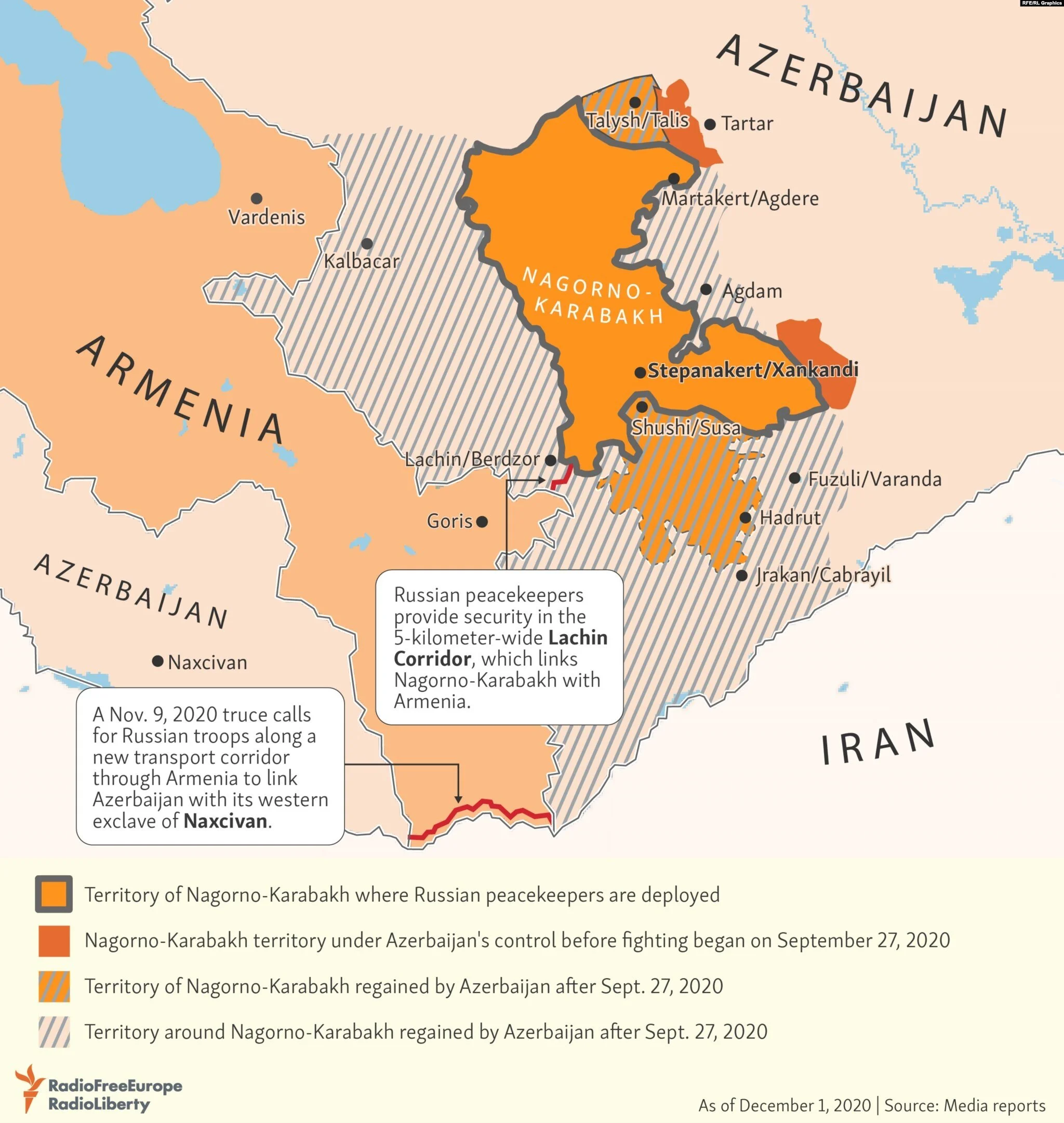Nagorno-Karabakh: A Quagmire of Competing Interests
On September 18, 2023, the Azerbaijani military launched their new special operation into Nagorno-Karabakh. Under the auspices of an anti-terror counter-insurgency, the Azerbaijani military moved to strike against Armenian militias operating in the region, undermining and trivialising the recent multilateral talks to negotiate a peaceful deal. Reports of a significant buildup of military equipment and vehicles along the border raised concerns for the safety of civilians, who have often been caught in the crossfire of this long-standing conflict.
The history of the conflict in this region is tragic, spanning many decades and claiming tens of thousands of lives. Tensions have been simmering since the fall of the Soviet Union and reached a boiling point on September 27, 2020. Following a sequence of mutual clashes, the protracted conflict escalated into a large-scale war, ultimately concluding 44 days later through a ceasefire agreement brokered by Russia. Termed as the Second Karabakh War, this conflict marked the most severe instance of violence involving ethnic Armenian and Azerbaijani forces since the 1994 ceasefire. Over 100,000 people were displaced, and more than 170 civilians were killed in the crossfire.
The conflict is not confined solely to Armenia and Azerbaijan's geopolitical ambitions. Russia and Türkiye are prominent actors in this conflict, with significant interests at stake. The ceasefire agreement brokered by Russia proved to be a substantial victory for Azerbaijan, with President Aliyev declaring the deal of “historic importance”. However, Russia has also strengthened its hand by mobilising 2000 troops on the Lachin Corridor, which connects Armenia to Nagorno-Karabakh and serves as the only internationally recognised access route for providing essential food and medical supplies.
With Azerbaijan now firmly having the upper hand, the launch of its “counter-terrorism operation” is particularly alarming for Armenia and Nagorno-Karabakh’s ethnic Armenian population. The Azerbaijani government justifies this recent incursion by claiming that “the continued presence of Armenia’s armed forces formations in the Karabakh region of Azerbaijan is the source of grave threat to regional peace”.
Following Türkiye’s increased military support for Azerbaijan in recent years, Armenia’s army is dwarfed by its adversary. As a result, Armenian PM Nikol Pashinyan has asserted that his country cannot engage militarily in the conflict, further damaging his credibility at home. Without significant international support, the future looks bleak for this beleaguered Prime Minister and his country’s claims to the contested region. Armenia’s military weakness has also raised concerns that Azerbaijan may attempt to seize the Zangezur Corridor, a vital transportation network that connects Azerbaijan's exclave of Nakhchivan with the rest of the country through southern Armenia.
Armenia and Azerbaijan adopt foreign policies to balance influences from the West and Russia. Consequently, this conflict has regional and global dimensions, with various actors involved. Armenia, facing closed borders to the east and west, is increasingly isolated following the Russian-brokered 2020 peace deal. Given its strong ties with countries like the US and France, Armenia also seeks cooperation with the EU and international community support.
In contrast, Azerbaijan, a key energy supplier and transit nation, carefully manages its relations with Russia and Türkiye concerning Nagorno-Karabakh. Azerbaijan's strategy in the conflict can be summarised as relying on Türkiye as a strategic ally while maintaining a balanced distance from Russia and Western actors. Türkiye’s involvement in the Nagorno-Karabakh conflict reflects its desire to reshape the regional status quo and supports Azerbaijan to counterbalance Armenia and its influential backers in the Minsk Group (USA, France, and Russia). Simultaneously, Ankara aims to enhance its regional influence by participating in conflict resolution efforts, as the close ties between Türkiye and Azerbaijan date back to the phrase "one nation, two states," coined by Aliyev Senior. Their involvement is legally grounded in the 2010 Strategic Partnership and Mutual Assistance Agreement.
Türkiye's involvement challenges Russia's formerly exclusive influence in the South Caucasus. A key concern is the potential destabilisation of the region, which could impact Russia's North Caucasus. Russo-Turkish relations remain tentative and guarded, without being hostile and “in a number of areas, both Russia and Türkiye are ready to promote partnership and cooperation.”
Türkiye’s role in the Nagorno-Karabakh conflict reflects its ambition to reshape the regional balance. While this challenges Russia's influence, shared interests in other areas may facilitate cooperation. The resolution of the conflict depends on various factors, including Armenia's engagement with Western nations and Türkiye’s assertive foreign policy, which raises concerns in Europe, where it is increasingly viewed as a challenging partner. The militarisation of Turkish foreign policy adds complexity to regional dynamics and is perceived as a potential threat to stability.
While regional powers play games of chess, the humanitarian cost is immense. Amidst the backdrop of other conflicts gaining media coverage and international attention, it is imperative that more efforts are made to care for and support internally displaced persons (IDPs) in Nagorno-Karabakh and its surrounding areas.

